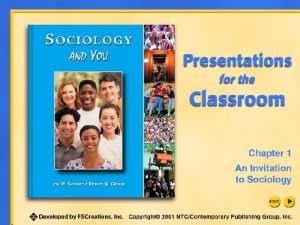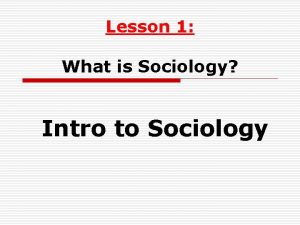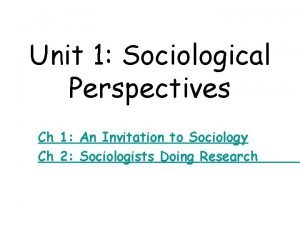Sociology 1 1 An Invitation to Sociology Mrs






- Slides: 6

Sociology 1 -1: An Invitation to Sociology Mrs. Deming

The Sociological Perspective n Sociology studies human social behavior. n It assumes a group, rather than an individual perspective.

Perspectives… n Perspective = a particular point of view ¨ Ex. Babies are usually cuter to their parents than they are to other people… ¨ Ex. Newlyweds nearly always find their spouses more attractive than their friends do… n We all see what is happening around us through our own perspectives—our own points of view!

The Sociological Perspective n Sociologists look for patterns in social relationships—social structure ¨ ex. High school students in a classroom behave in different ways— always listen, daydreaming, instigator, jokester… n Any high school, you will find patterned relationships—teachers lecture, students take notes, tests, assemblies, lesson plans, etc. n Teachers and students may be different but the pattern interaction is roughly the same—social structure

The Sociological Perspective n Individuals can benefit by using their sociological imaginations to look at events in their personal lives. n Sociological imagination—C. Wright Mills; the ability to see the relationship between events in their personal lives and events in their society

Sociological Imagination—How do I apply it? n People do not make decisions in isolation n For example, historically American society has shown a strong bias against childless or one child families ¨ Seen as selfish or “spoiled” children n These values come from a time when large families were needed for survival—farming; many died at birth or in infancy n Today, we are reading about the benefits of one-child families; change in attitude and needs of society led to a change in the attitude towards a decrease in family size











